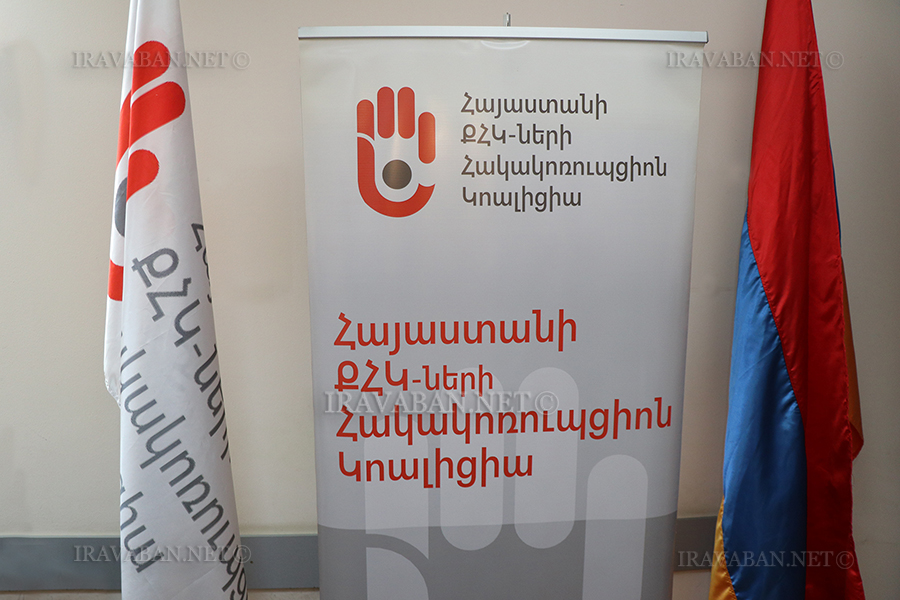The CSO Anti-Corruption Coalition of Armenia calls on the President of the Republic of Armenia not to sign the 2 (two) Laws adopted in the second reading by the National Assembly of the Republic of Armenia at the extraordinary session of 23 December, 2022, which are aimed at the introduction of the universal income declaration system (hereinafter: System) for natural persons in the country from 1 January, 2023. The Governing Board of the CSO Anti-Corruption Coalition of Armenia has issued a statement about this.
“The Draft Laws were fully adopted by 67 votes “for”, 33 “against” and 0 (abstentions), after being submitted by the RA Government to the RA National Assembly for consideration in an urgent mode.
While appreciating the initiative of the RA Government, we would like to emphasize that, despite the anti-corruption basis of such reforms, the implementation of the System in the current geopolitical and socio-economic conditions, is untimely and fraught with serious economic and social consequences.
We also consider it necessary to note that with the urgent adoption of that decision, the RA political authorities once again did not listen to the opinions of the civil society and professional organizations [1]/see the link here/, which speaks of the improper implementation of the international commitments of the RA Government regarding constructive cooperation with civil society organizations.
According to our estimates, the main hidden objective for the implementation the System is to provide additional privileges to high-income earners, public office holders, who, based on their social and property positions, will have the opportunity to actively use the social credit system, thus once again not fulfilling their tax obligations to the RA state budget: At the same time, along with the implementation of the System, an opportunity to collect additional taxes from socially disadvantaged and having low-income citizens of the RA at the expense of the transfers sent to them will be created.
Under the conditions of the current legislation and the ideology that forms it, the implementation of the System will not help to overcome the economic and social challenges that the Republic of Armenia is facing.
With this, the RA political authorities will further deepen social inequality and injustice, which will create new challenges for the physical and economic security of the population.
According to our estimates, the implementation of the System in the country cannot be started until:
- the system of the flat income tax regime has not stopped and the transition to the five-level progressive taxation regime of income tax is not made,
- there is transition to the regime of tax collection with truly fair progressive scales of other types of taxes and mandatory fees,
- the discriminatory and unequal legal regulations for the return of income tax have not been eliminated,
- the legal foundations of the institution of social credits have not been developed,
- the compatibility of e-government platforms has been ensured,
- other system implementation tools have been developed,
- the cost-effectiveness and usefulness of the implementation of System’ has been assessed,
- the expected response and capabilities of RA citizens has been assessed.
At the same time, we believe that the introduction of the System cannot be started simultaneously with the reforms implemented in the country, such as comprehensive health insurance, reforms of the order of issuing identification cards.
According to our estimates, as a result of the implementation of the System:
- serious obstacles will arise in the direction of the implementation of investments in the country and the further development of the economy,
- the development of the shadow economy will be promoted, making the vicious practices of non-registration of employers, transfer of income to the shadow more frequent,
- at this stage, attempts to identify revenues and increase the revenues of the state budget through the introduction of the proposed System will not give significant results,
- from the outset, the reputation of the System will be tarnished and serious problems will arise in the direction of its main goals in the future.
Based on the above, we call on the President of the RA.
- not to sign the Laws aimed at introducing the System,
- challenge the constitutionality of these laws in the RA Constitutional Court,
- send them back to the RA National Assembly:
- In order to hold detailed discussions with professional organizations and interested civil organizations of the RA,
In order to take steps to complete the development of the necessary tools for the implementation of the System.”















